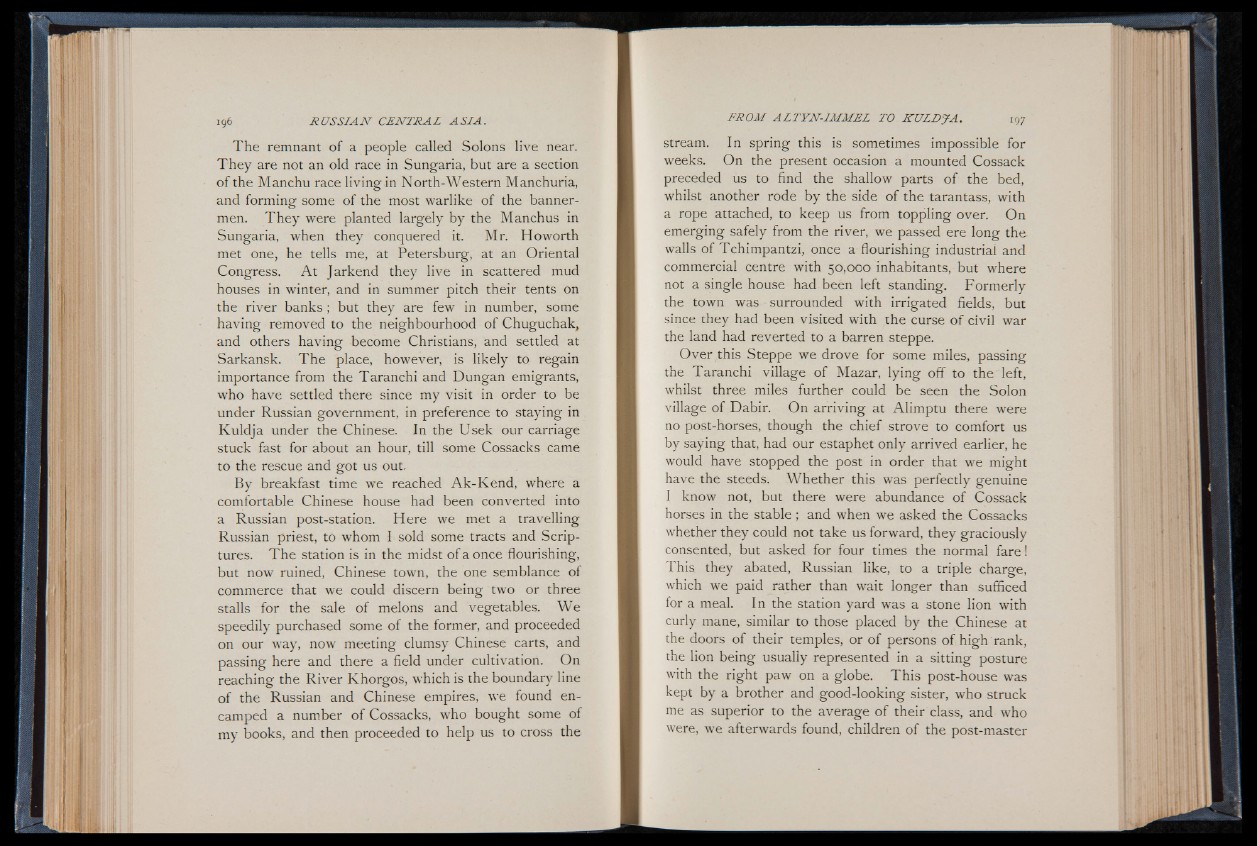
The remnant of a people called Solons live near.
They are not an old race in Sungaria, but are a section
of the Manchu race living in North-Western Manchuria,
and forming some of the most warlike of the banner-
men. They were planted largely by the Manchus in
Sungaria, when they conquered it. Mr. Howorth
met one, he tells me, at Petersburg, at an Oriental
Congress. A t Jarkend they live in scattered mud
houses in winter, and in summer pitch their tents on
the river banks; but they are few in number, some
having removed to the neighbourhood o f Chuguchak,
and others having become Christians, and settled at
Sarkansk. The place, however, is likely to regain
importance from the Taranchi and Dungan emigrants,
who have settled there since my visit in order to be
under Russian government, in preference to staying in
Kuldja under the Chinese. In the Usek our carriage
stuck fast for about an hour, till some Cossacks came
to the rescue and got us out.
By breakfast time we reached Ak-Kend, where a
comfortable Chinese house had been converted into
a Russian post-station. Here we met a travelling
Russian priest, to whom I sold some tracts and Scriptures.
The station is in the midst of a once flourishing,
but now ruined, Chinese town, the one semblance of
commerce that we could discern being two or three
stalls for the sale of melons and vegetables. We
speedily purchased some of the former, and proceeded
on our way, now meeting clumsy Chinese carts, and
passing here and there a field under cultivation. On
reaching the River Khorgos, which is the boundary line
of the Russian and Chinese empires, we found encamped
a number of Cossacks, who bought some of
my books, and then proceeded to help us to cross the
stream. In spring this is sometimes impossible for
weeks. On the present occasion a mounted Cossack
preceded us to find the shallow parts of the bed,
whilst another rode by the side of the tarantass, with
a rope attached, to keep us from toppling over. On
emerging safely from the river, we passed ere long the
walls of Tchimpantzi, once a flourishing industrial and
commercial centre with 50,000 inhabitants, but where
not a single house had been left standing. Formerly
the town was surrounded with irrigated fields, but
since they had been visited with the curse of civil war
the land had reverted to a barren steppe.
Over this Steppe we drove for some miles, passing
the Taranchi village of Mazar, lying off to the left,
whilst three miles further could be seen the Solon
village of Dabir. On arriving at Alimptu there were
no post-horses, though the chief strove to comfort us
by saying that, had our estaphet only arrived earlier, he
would have stopped the post in order that we might
have the steeds. Whether this was perfectly genuine
I know not, but there were abundance of Cossack
horses in the stable; and when we asked the Cossacks
whether they could not take us forward, they graciously
consented, but asked for four times the normal fa re !
This they abated, Russian like, to a triple charge,
which we paid rather than wait longer than sufficed
for a meal. In the station yard was a stone lion with
curly mane, similar to those placed by the Chinese at
the doors of their temples, or of persons of high rank,
the lion being usually represented in a sitting posture
with the right paw on a globe. This post-house was
kept by a brother and good-looking sister, who struck
me as superior to the average of their class, and who
were, we afterwards found, children of the post-master